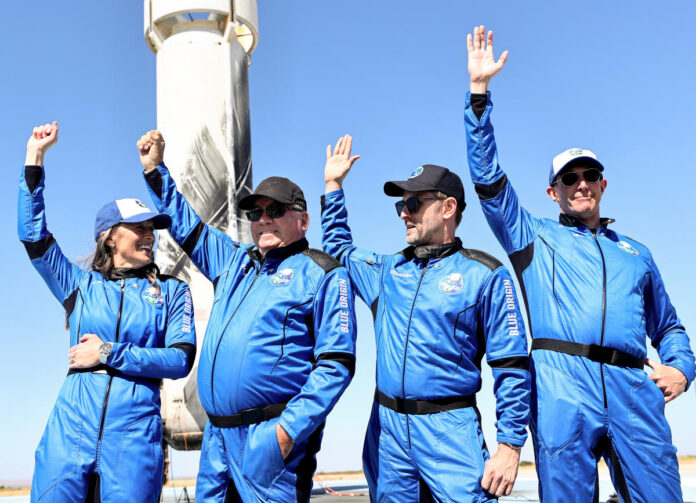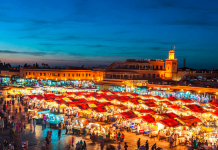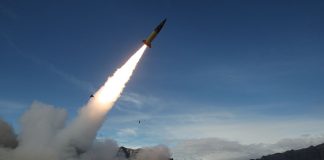Blue Origins vice president of mission and flight operations Audrey Powers, Star Trek actor William Shatner, Planet Labs co-founder Chris Boshuizen and Medidata Solutions co-founder Glen de Vries on the landing pad of Blue Origins, owned by Jeff Bezos (Photo by Mario Tama/Getty Images)
Space tourism has been spearheaded by smiling billionaires such as Jeff Bezos and Richard Branson – but it could be an environmental disaster.
Black soot emitted by space launches amplifies their warming effect – and space tourism could also undo decades of progress on the ozone layer, researchers have warned.
Researchers from UCL used a 3D model to explore the impact of rocket launches and re-entry, and the impact of projected space tourism scenarios based on the recent billionaire space race.
The researchers found that black carbon (soot) particles emitted by rockets are almost 500 times more efficient at holding heat in the atmosphere than all other sources of soot combined (surface and aircraft).
This results in an enhanced climate effect.
Read more: What are fast radio bursts, and why do they look like aliens?
Space tourism could also have a catastrophic effect on the ozone layer, the researchers warn.
Current growth trends around space tourism indicate potential for future depletion of the upper stratospheric ozone layer in the Arctic in spring.
Pollutants from solid-fuel rockets and re-entry heating of returning spacecraft and debris are particularly harmful to stratospheric ozone.
Study co-author Dr Eloise Marais (UCL Geography) said: “Rocket launches are routinely compared to greenhouse gas and air pollutant emissions from the aircraft industry, which we demonstrate in our work is erroneous.
“Soot particles from rocket launches have a much larger climate effect than aircraft and other Earth-bound sources, so there doesn’t need to be as many rocket launches as international flights to have a similar impact.
“What we really need now is a discussion amongst experts on the best strategy for regulating this rapidly growing industry.”
Read more: A 1988 warning about climate change was mostly right
To calculate the findings, the researchers collected information on the chemicals from all 103 rocket launches in 2019 from across the world, as well as data on reusable rocket and space junk re-entry.
Story continues
They also used the recent demonstrations by space tourism entrepreneurs Virgin Galactic, Blue Origin and SpaceX and proposed yearly offerings of at least daily launches by Virgin Galactic to construct a scenario of a future space tourism industry.
These data were then incorporated into a 3D atmospheric chemistry model to explore the impact on climate and the ozone layer.
Read more: Why economists worry that reversing climate change is hopeless
The team found that, under a scenario of daily or weekly space tourism rocket launches, the impact on the stratospheric ozone layer threatens to undermine the recovery experienced after the successful implementation of the Montreal Protocol.
Adopted in 1987, the Montreal Protocol global ban on substances that deplete the ozone layer is considered one of the most successful international environmental policy interventions.
Study co-author Dr Robert Ryan said: “The only part of the atmosphere showing strong ozone recovery post-Montreal Protocol is the upper stratosphere, and that is exactly where the impact of rocket emissions will hit hardest. We weren’t expecting to see ozone changes of this magnitude, threatening the progress of ozone recovery.
“There is still a lot we need to find out about the influence of rocket launch and re-entry emissions on the atmosphere — in particular, the future size of the industry and the types and by-products of new fuels like liquid methane and bio-derived fuels.
“This study allows us to enter the new era of space tourism with our eyes wide open to the potential impacts. The conversation about regulating the environmental impact of the space launch industry needs to start now so we can minimise harm to the stratospheric ozone layer and climate.”
Watch: Astronauts will be able to grow steak in space












